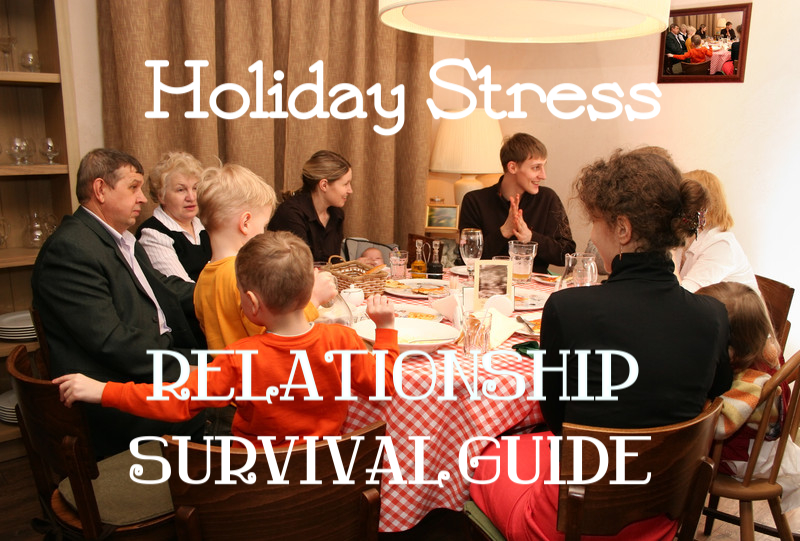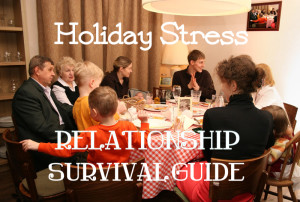
14 Nov Holiday Stress: Relationship Survival Guide!
Relationship Survival Guide!
Let’s face it; as much as we love the holidays, they can be stressful, especially on our relationships. In fact, holiday relationship stress is the most common thing I hear about in my psychology practice this time of year. Whether it’s kids, parents, partners, siblings, friends, or extended family, the stress of the holidays can definitely push relationships to their limits.
Holiday Relationship Stress & Expectations
So, what causes holiday relationship stress? There are a plethora of answers we could list here, from past relationship issues, to financial stress, to the “busyness” of the holiday season. But, for the most part, holiday relationship stress really boils down to one thing: expectations. Specifically, two types of expectations:
1) Expectations from others: Your in-laws expect you to visit for the holidays, but you really want to stay home. Your kids and spouse want to stick with the old traditions, but you want to start some new ones. Your parents and siblings booked a small cabin “for the whole family” to stay together for 3 days/nights, but you’re already exhausted and know it’s a disaster waiting to happen!
2) Expectations from yourself: You expect the perfect gift from your husband. You expect the kids to gather lovingly at your feet each night for hot cocoa and a holiday story. You expect your friends to add to the magic of the holiday season, not add more drama to your life with their personal problems. You expect your extended family to understand why you’re staying home for the holidays this year.
I’ve said it before, and I will say it again, “All frustration comes from expectations”. And at no time are expectations higher or loftier than during the holiday season.
Holiday Relationship Survival Skills
So, what can we do to ensure our relationships survive the holidays? Start by following these three simple rules:
1) Examine, alter, and communicate expectations. When your expectations are too high or unrealistic, you’re setting yourself up for failure. Instead, identify what you expect and compare it with the expectations of your loved ones. If they don’t match up, then you either need to alter your expectations or your reality. (Hint: It’s much easier to alter expectations than reality!)
If your expectations, however, are realistic, then make sure you communicate them. For example, if you expect a nice gift and he expects no gifts, you should probably discuss and compromise before the holidays hit, otherwise you’ll end up frustrated and disappointed. (For more on this, check out “Frustration & Expectations: 4 Steps for Lowering Expectations & Obliterating Frustration”).
2) Listen to your heart, not your head. It may seem counterintuitive to let your heart run things during the holidays, but I’ve found that, when we’re talking about relationship stress, we tend to ignore how we really feel because our head tells us to “be nice” to others, to make sure they’re not hurt, to just keep the peace. And while all of these are worthy ideals, they’re not always the healthiest for us or for our families. That’s where listening to your heart comes in. Ask yourself, “What is the loving thing to do?” Then do it. And remember– “pleasing” others and “loving” others is not the same thing; and you don’t have to please others in order to love them.
3) It’s ok to set boundaries: Healthy boundaries=Healthy relationships. Most of us think if we set a boundary we are just “hurting” or “keeping love away from” others. Sure, others might not like our boundaries (especially if we’ve never set them before), but boundaries are really there to help us express our needs and keep us safe and healthy, so we can send more love out. Yes, setting healthy boundaries is quite often the loving thing to do.
Imagine if you never set boundaries with your children, allowing them to talk disrespectfully and order you around. Is that healthy? No. Setting a boundary of “you will treat me with respect” makes you, your child, and your relationship stronger. The same goes for your partner, friends, and the rest of your family. When you know you’re just going to be upset, hurt, or otherwise negatively impacted by a person or a situation, boundaries are necessary—for you and for them. Identify what you need, communicate it and then keep your boundaries.
“How do I implement my new ‘Holiday Relationship Survival Skills’?”
Good question. To get you started using your relationship survival skills, I’ve listed a few ideas. Try one, several, or discover your own  ideas, and make this holiday season a time for your relationships to not only survive, but to thrive!
ideas, and make this holiday season a time for your relationships to not only survive, but to thrive!
With Kids:
Ask each child “What is your favorite tradition?” and then focus on only those things. Asking allows them to communicate their epectations to you. And that allows you to choose to focus on what matters most to them and let go of any other expectations you thought they had of you. Chances are your children don’t care as much as you do about most of what you’re stressing about.
Couples:
Think of one or two things you would like your spouse to do for/with you and then clearly communicate those things. State, don’t ask for your expectations to be met. Say, “This is what I need. How can we make it work?” (Watch my 30SecondMom tip on this!).
Be ready and willing to compromise. If you want your needs met, you have to be willing to also meet your partner’s needs. Listen to their expectations, then help them identify whether those expectations are realistic or not and how you can meet them half way!
Remember their love language. If they care a lot about gifts, make sure you get a good one. If they’re more about verbal affirmations, write a poem or make sure to continually tell them you love them. Speaking the language of love they like to hear will help you both feel close and connected all holiday season! (Watch my 30SecondMom tip for more on this!).
Extended Families:
Remember, you really can’t please everyone, so focus on communicating your love to your family while ensuring your own well being too. Simply say, “I love you, and this is what I need right now.” For example, you could agree to a holiday dinner with extended family, but not the entire 3-day cabin stay. You could stop by your in-laws for an hour or two, express your love and gratitude and then go home. Or, you could opt to do things on your own this year or alternate years to try something new. It’s even ok to simply say, “You know I love you, but it’s just not going to work for us this year.” Remember to use your heart and do the loving thing!
Friends:
Involving friends in your holiday plans can be a wonderful time to reconnect. But if they’re not in a healthy place, it can be tough. For friends who are in crisis during the holidays, just remember to ask yourself: “Is this my problem or theirs?” You are not responsible for other people’s problems. If you can support them, then great! But if they’re dragging you down it’s ok to say, “No.” Remember, healthy boundaries are good for healthy holiday relationships.
What do you think? Do you ever feel like holiday relationships are challenging? How so? How do YOU handle holiday relationship stress? Leave us a comment below!
Be sure to check out my new bestselling memoir,
This is How We Grow, available now on Amazon.com!
SUBSCRIBE, below, and please “like” my Facebook pages (Dr. Christina Hibbert; This Is How We Grow) and follow me on Twitter,Pinterest, & Instagram!
And be sure to check out my Amazon Author Central Page! Join the discussion!
You may manage your subscription options from your profile
Related Posts:
Join my “This is How We Grow” Personal Growth Group! FREE. Online. Growth.
6 Ways to Create a More Peaceful Christmas Holiday
“Be of Good Cheer!”: 12 Ways to Become More Cheerful
Create a more Meaningful Christmas with “The 5 Gifts of Meaning”
This Holiday Season, Make it a 4-Gift Christmas
50 Ways to Love your Loved Ones
“The 5 Love Languages”: Improve Relationships & Feel the Love!
Practicing Patience: 20 Ways to Be More Patient Today
“This Is How We Grow” Blog Hop: 10 Ways I Choose to Grow Each Day
10 Benefits of Practicing Gratitude
The Positive Psychology of Flourishing: What is it? And am I doing it?
Slow Down & See: How to Appreciate the Richness of Life
“Achieving Balance”: Why You’ve Got it Wrong, & How to Get it Right

